'They don't have a political strategy so they are going to try to deal with it purely as a law and order problem.'
'They will try to use the same strategy they have repeatedly used since 2014 in Kashmir.'
'Mr Modi has landed in a situation where he faces the possible prospect of not only being unable to Indianise Kashmir, but his actions may end up making the rest of India a virtual carbon copy of Kashmir.'
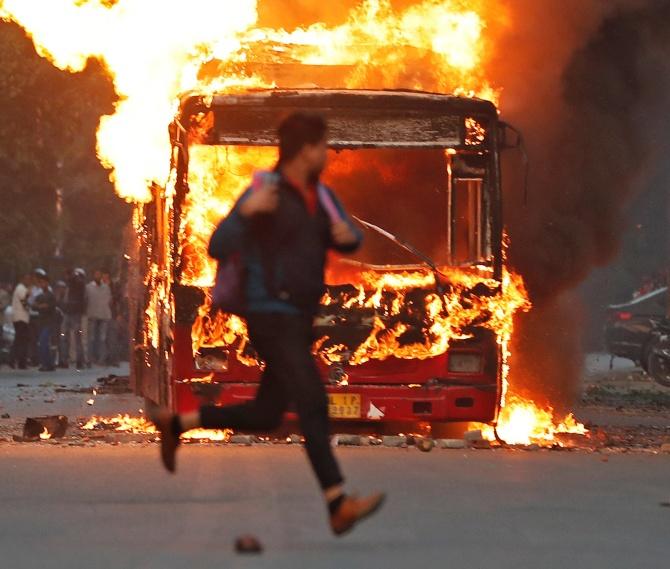
The Modi government, says Nilanjan Mukhopadhyay -- author of Narendra Modi: The Man, The Times and The RSS: Icons Of The Indian Right -- has been blindslided by the waves of protests that have engulfed India against the Citizenship (Amendment) Act.
The government's ham-handed response has not surprised him, says the Delhi-based journalist. "They are hoping this movement peters out and that people come to accept the CAA as it has been passed," Mukhopadhyay tells Savera R Someshwar/Rediff.com. "Failing which, we are in for a phase of repression in this country and the kind of repressive police action we have seen in Delhi since last Friday."
Do you think Narendra Modi expected this kind of backlash to the Citizenship (Amendment) Act?
They definitely did not anticipate this kind of reaction; otherwise, they wouldn't have timed it with the arrival of (Japanese Prime Minister) Abe Shinzo in Guwahati for his meeting with Modi.
They thought the reaction to the Citizenship (Amendment) Act would be muted and limited to the intelligentsia and liberal circles.
They had not expected the kind of mass furore that rose in the north east and spread across the rest of the country.
This was a case of gross miscalculation on their part and a symptom of the overconfidence that has been visible for quite some time in the government's functioning.
Modi has never encountered such unrest before. How will he react?
This is definitely the biggest political challenge Mr Modi has faced in the five-and-a-half years since he has been prime minister.
He is not someone who backtracks. He is not someone who says, 'I'm sorry, I made a mistake. Can we make a fresh beginning?'
He's the kind of a person who gets into one way streets all the time. The only way he can get out is by increasing the speed and crashing into the wall in the hope that it breaks and he can drive past it.
They are hoping this movement peters out and that people come to accept the CAA as it has been passed. Failing which, we are in for a phase of repression in this country and the kind of repressive police action we have seen in Delhi since last Friday.
Wherever there are protests, they will try to deal with it by letting loose the police the way it has been done in Jamia in the hope that repression will scare the people and the young will be told by their families to not participate in the protest.
And they'll have their social media brigade in hyper active mode.
But, as such, they don't have a political strategy so they are going to try to deal with it purely as a law and order problem. They will try to use the same strategy they have repeatedly used since 2014 in Kashmir.
Mr Modi has landed in a situation where he faces the possible prospect of not only being unable to Indianise Kashmir, but his actions may end up making the rest of India a virtual carbon copy of Kashmir.
Stone pelting, which we have seen during the last few days, is a device which has been borrowed from Kashmir.
Cities like Delhi, which have had a history of students's protests, have never seen stone pelting.
I've been a resident of Delhi since 1979 and I've also had a very brief engagement in student politics, but stone pelting was unthinkable.
Whether the students did it, or whether it was the outsiders, is a secondary issue.
The point is that stone pelting, which is a very dangerous form of protest, has moved beyond Kashmir to the rest of the country.
Mr Modi has not rolled back decisions -- be it demonetisation, GST or the abrogation of Article 370, Will he stay firm on CAA and NRC?
He rolled back on land acquisition very early in 2015. But that was because there was pressure from the Sangh Parivar also.
He has only made concessions on issues that do not involve ideology. But, as far as ideology is concerned, I do not see him rolling back.
How do you think the Sangh Parivar is reacting to the CAA and what is happening across the country?
The Sangh Parivar would be very happy with the CAA.
Let me take you back to the Assam agitation (against illegal immigrants) in the early 1980s (1979 to 1985).
Balasaheb Deoras (Madhukar Dattatraya Deoras) was the sarsanghchalak of the RSS then. In his detailed statement on the agitation, he said it was important to distinguish between the Muslim illegal immigrant and the Hindu refugee; that the Hindus from Bangladesh had nowhere to go but Bharat.
So it is the ideological position is that India must be the homeland for Hindus because the homeland of Muslims is elsewhere. There is no need for them to see this as their natural home. This is not the natural home.
This is very similar to Israel's Law of Return (passed on July 5, 1960, it gives every Jew the right to come and live in Israel and get Israeli citizenship).
The RSS too believes that Hindus have a right to return to India, which is why it will be very happy with the CAA.
The RSS will campaign about the CAA within the neighbourhood. But it will also see whether their swayamsevaks will be at risk if they start going door-to-door.
If the anger starts rising, I do not see the RSS willing to risk it. They are known to play very safe.
If they see that public opinion is against it, they will say, 'Okay, let's forget it for the moment, we'll wait for the next opportunity. Let's not risk our cadre.'
Why is Modi not directly engaging with the students? He has many options -- he is hugely popular on social media, there's Modi TV, he could address the nation, there's Mann Ki Baat...
If the violence escalates, Mr Modi may address the nation, but, then again, it is going to be a monologue.
Mr Modi doesn't believe in engaging and having dialogues.
If we look at his entire political approach, his campaign, it has always been about taking a stand and then preaching about it. He has never been the kind of person who'd listen to the other side and see if his adversaries actually have a case.
It somehow doesn't fit into his psyche.
Modi has projected himself as a leader of the youth. The youth seem to have turned against him now. How big of a blow is this for him?
I think this is a huge blow and it all depends on how events unfurl in the next week or fortnight.
If the protests continue, then Mr Modi will have to think of alternative strategies because he is not a Test match player.
His preferred way of operating is the T20 or ODI mode -- pick up an issue, score a couple of quick brownie points and that's the end of the matter. That is what happened with Article 370, triple talaq, Ayodhya, demonetisation...
So far, he has not shown himself as a person who can face a long campaign against him and come up with counter strategies.
It is only history that will tell us if -- like what happened to the UPA in 2011 -- what is happening now is the beginning of the unravelling of Mr Modi.
It will depend very hugely on whether Mr Modi is able to come up with new strategies.
Here too, he has to be aware that a lot of the tools which he used are no longer available to him exclusively.
Social media, for instance. There was a time when the advantage was with the Sangh Parivar. Today, it is evenly distributed because the others are as smart on the social media as he is.
The kind of mobilisation we saw late Sunday night outside the (Delhi) police headquarters was possible because of the way social media was used.
When the prime minister says those creating violence can be identified by the clothes they are wearing, does it not incite divisiveness?
It is very unfortunate that the prime minister of the country actually uses language that is a sheer instigation to violence. You are just deepening the social prejudices in the country by saying a particular community wears different kinds of clothes.
It's a virtual call to the Hindus that Muslims are opposed to the CAA and it is also saying that the attack on Modi, on the BJP, is an attack on the nation.
It is completely unacceptable for the prime minister to say that I am the nation.
This means we have gone back to the D K BOrooah (president of the Indian National Congress during the Emergency) era of 'India is Indira and Indira is India' (a slogan Dev Kanta Borooah coined).
So now Mr Modi is the mirror image of Indira Gandhi during the Emergency.
I think it is shameful.
And when a person who does this talks against the Emergency and says it is one of the darkest days in India's history, it is sheer hypocrisy.
Is this not negatively impacting India's international image?
Oh, I think it has been a huge issue.
Mr Modi cares very much for his international image.
That is why I'm saying they have been undermined by their own over-confidence as far as acceptance of the CAA is concerned.
What happened with Abe Shinzo is a huge embarrassment.
The Bangladesh decision to cancel the visit of two of its ministers (Finance Minister Mustafa Kamal and Home Minister Asaduzzaman Khan) is a significant embarrassment.
Mr Modi will have to now completely reorient his foreign policy approach.
They have to send a message to the global community that India is not pursuing a majoritarian path and we are back again, doing business as a liberal but maybe slightly authoritarian State. That will be acceptable to the global community.
Mr Modi has to take steps to be de-escalate with his foreign colleagues.
Their current approach simply cannot continue if they want to regain the initiative they once had.
What else can he do to reclaim his dream of being seen as an international statesman?
He has to fix the economy.
He has to address the livelihood concerns of the people.
He has to be seen as a more tolerant leader and as somebody who is responsive to criticism.
I know this is the era of autocratic leaders who don't like criticism.
He may have a lot of mates in the Donald Trumps of the world, but Mr Modi must understand that the current protests have shown that India is a slightly different kind of country.
Why are the CAA and NRC so important to Mr Modi?
Ideologically speaking, the CAA is very important to Mr Modi.
It takes the country one notch closer to being a completely majoritarian State.
It further marginalises and discriminates against Muslims.
It is the beginning of the process of disenfranchisement of the Muslims because, once you start excluding people on the basis of their religious identity, it will lead to a lot of other changes.
What will happen to those who have lived in this country for decades but are unable to prove their citizenship?
None of the neighbouring countries -- Pakistan, Bangladesh or Afghanistan -- are going to take them back.
So are we going to set up detention camps everywhere? So is this a repeat of Auschwitz? Where are we getting into?
They are many questions at the moment because Mr Modi typically does not provide all the answers right away.
What does he need to do tamp down the flames that are fanning across the country?
They should invite the Opposition leaders for talks, put the CAA under suspended animation.
They should then go in for a review and let the people know that they are going to hold further discussions.
If needed, they should find ways to denotify the CAA because they have already issued a Gazette notification.
While protests against the CAA have spread across the country, we don't know how long they will sustain.
Mr Modi hopes they will die down. But if they don't, then what?
You cannot keep on arresting people everywhere.
You cannot keep on having police firing and using tear gas.
It will be ruinous for the economy.
The peak tourist season has begun and will go on till the summer ends.
At the moment you have advisories against traveling to the north east; soon, you may have travel advisories against India.
Would you say that Modi is a man who misses the larger picture in the pursuit of his ideological agenda?
Yes, definitely.
His ideological agenda drives him which is why the ideological Modi is more visible than the pragmatic Modi.
As prime minister, you have to be more pragmatic than ideological.
He hopes to go down in history as the man who moulded India into a Hindutva nation. Is secularism important to Modi?
Secularism, the kind we know in India, doesn't make sense to him.
He has a completely majoritarian view of what India should be.
He is committed to the principles of a Hindu Rashtra.
His definition of the Indian nation is not an inclusive one. He believes in cultural nationalism.
He doesn't think that India, the nation, is a territory; he thinks that India, the nation is a people who are culturally Hindus.
He says that being a Hindu does not mean are a follower of Hinduism. That being Hindu is different from being a practising Hindu. That you can practise different faiths, but you are still a Hindu.
It might sound very incongruous and make no sense to somebody who doesn't believe in the principles of cultural nationalism, but Mr Modi does.
He thinks everybody in this country is a Hindu and if you do not agree with that then you do not have the same privileges that the others have.
That is why, the CAA...
Do you believe India is slowly turning into an autocracy under Mr Modi?
It definitely has been moving towards becoming electoral authoritarianism.
It definitely is moving towards becoming a more majoritarian State where the minorities are discriminated against and subjugated.
Savera R Someshwar has been at Rediff.com since its inception.
She can be reached at saveras@rediff.co.in

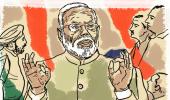

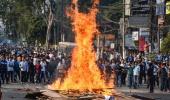




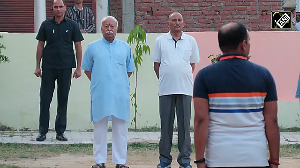
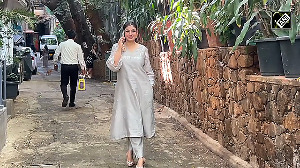

 © 2025
© 2025